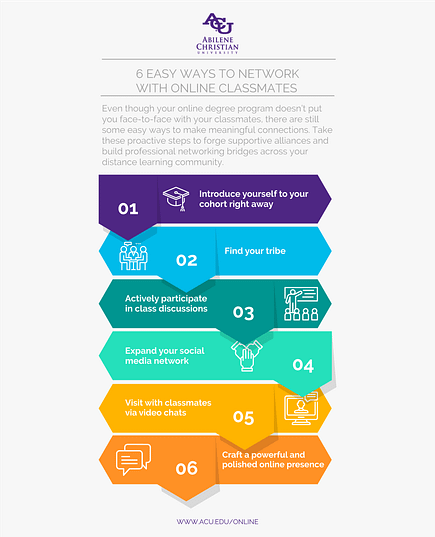Online degree programs are great for self-starters who love the flexibility and autonomy they afford. However, the downside is there’s less face-to-face contact with peers. Some online students worry that this lack of in-person networking will affect their ability to cultivate the professional relationships so vital to post-graduation career success.
Professional connections are a significant factor in job placements. In fact, some studies show that up to 85 percent of positions are filled thanks to referrals from trusted sources. Knowing the “right” well-connected people is essential when you’re hoping to get hired, reports consultant Lou Adler after performing job-hunting research with LinkedIn. Jobvite’s 2018 Job Seeker Nation study found that 60 percent of survey respondents stated they’ve referred a friend or contact to a company.
Even though your online degree program doesn’t put you up close and personal in the flesh with your classmates, there are still some easy ways to make meaningful connections. Take these proactive steps to forge supportive alliances and build professional networking bridges across your distance learning community.
1) Introduce yourself to your cohort right away
Participate in any online orientation events or “getting to know you” discussion forums your online university offers. Remember how important first impressions are and be engaging and authentic in what you share. If you’re a bit of a comic, let your sense of humor shine. People will make a mental note that you’re the quick-witted, funny one.
Disclose a bit of personal information that others might relate to in your icebreaker exercise. Do you have kids? Adore your pets? Are there certain sports, hobbies, musicians, or authors that rock your world? Be discerning and appropriate about your initial sharing but provide enough interesting tidbits about yourself to catch the attention of like-minded classmates who are eager to connect with you.
2) Find your tribe
Human nature makes us instantly gravitate toward some people and feel a bit put off by others. Notice who you feel a special kinship with as your classmates introduce themselves. You might even want to jot down a few notes and quick associations that you can refer to in more private discussions later.
Follow up more personally with the people who sparked your interest. Point out things you have in common and ask open-ended questions to deepen the conversation. Take a genuine and sincere interest in these online classmates. For all you know, you could be laying the foundation for a friendship that lasts the rest of your life.
3) Actively participate in class discussions
Be a visible and dynamic presence in the discussion boards for your readings and assignments. Take on a leadership role in a group project. Contribute a thoughtful perspective when you have insights to share and acknowledge your cohort members when they do the same. If you offer your expertise and opinions generously and humbly, you’ll help build a collaborative online community while ensuring that you stand out as a strong, positive personality.
Your ability to express yourself clearly and intelligently in writing will leave a favorable impression on both your peers and professors. This can be very important down the line when you may turn to these same people for employment references and job referrals.
4) Expand your social media network
Leverage your social media accounts to connect with your classmates, professors, and college. Post comments on your university’s Facebook page, participate in Twitter discussions and link up with industry thought leaders on LinkedIn. The more online networking strategies you employ, the broader your exposure will be to people who can play a huge role in your post-graduation career advancement.
5) Visit with classmates via video chats
Use video conferencing platforms such as Skype, Zoom, FaceTime, and Google Hangouts to share with classmates and instructors in a more intimate, real-time way. These video networking tools are great for one-on-one dialogues as well as group meetings, and they let you really get a sense of each other’s personalities.
6) Craft a powerful and polished online presence
In addition to your social media accounts, start creating a professional online profile. You might want to put up a simple personal website that highlights some of your past accomplishments and future career aspirations. If you’re a writer, link to published articles and post your best pieces to your LinkedIn profile for sharing.
Always comport yourself professionally online, since a primary goal is to attract career opportunities. Keep your profiles accurate, up-to-date, and complete. Include a current professional photo, a personal summary, an overview of your skills, and your career goals. A robust online presence can help you build key industry connections as long as your personal brand is clear, consistent, and credible.
Would you like to learn more about a Christ-centered online degree program that comes to you? Abilene Christian University offers a variety of online graduate degrees and certificates that let you advance your career while being part of a vibrant, virtual, Christian community. There’s no need to relocate, so you can earn your degree while balancing the demands of work, life, and your community.

